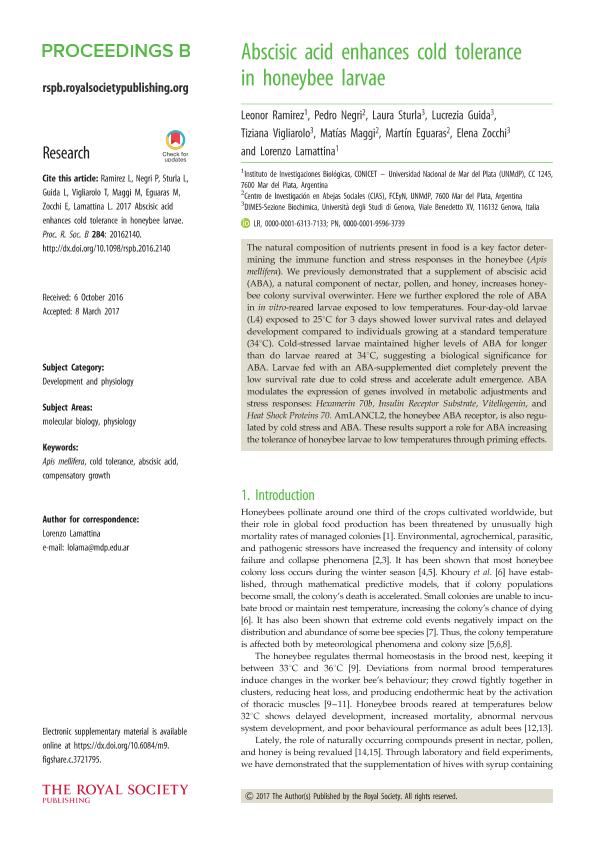Artículo
Abscisic acid enhances cold tolerance in honeybee larvae
Ramírez, Leonor ; Negri, Pedro
; Negri, Pedro ; Sturla, Laura; Guida, Lucrezia; Vigliarolo, Tiziana; Maggi, Matías Daniel
; Sturla, Laura; Guida, Lucrezia; Vigliarolo, Tiziana; Maggi, Matías Daniel ; Eguaras, Martin Javier
; Eguaras, Martin Javier ; Zocchi, Elena; Lamattina, Lorenzo
; Zocchi, Elena; Lamattina, Lorenzo
 ; Negri, Pedro
; Negri, Pedro ; Sturla, Laura; Guida, Lucrezia; Vigliarolo, Tiziana; Maggi, Matías Daniel
; Sturla, Laura; Guida, Lucrezia; Vigliarolo, Tiziana; Maggi, Matías Daniel ; Eguaras, Martin Javier
; Eguaras, Martin Javier ; Zocchi, Elena; Lamattina, Lorenzo
; Zocchi, Elena; Lamattina, Lorenzo
Fecha de publicación:
05/04/2017
Editorial:
The Royal Society
Revista:
Proceedings of the Royal Society of London. Series B: Biological Sciences
ISSN:
0962-8452
Idioma:
Inglés
Tipo de recurso:
Artículo publicado
Clasificación temática:
Resumen
The natural composition of nutrients present in food is a key factor determining the immune function and stress responses in the honeybee (Apis mellifera). We previously demonstrated that a supplement of abscisic acid (ABA), a natural component of nectar, pollen, and honey, increases honeybee colony survival overwinter. Here we further explored the role of ABA in in vitro-reared larvae exposed to low temperatures. Four-day-old larvae (L4) exposed to 258C for 3 days showed lower survival rates and delayed development compared to individuals growing at a standard temperature (348C). Cold-stressed larvae maintained higher levels of ABA for longer than do larvae reared at 348C, suggesting a biological significance for ABA. Larvae fed with an ABA-supplemented diet completely prevent the low survival rate due to cold stress and accelerate adult emergence. ABA modulates the expression of genes involved in metabolic adjustments and stress responses: Hexamerin 70b, Insulin Receptor Substrate, Vitellogenin, and Heat Shock Proteins 70. AmLANCL2, the honeybee ABA receptor, is also regulated by cold stress and ABA. These results support a role for ABA increasing the tolerance of honeybee larvae to low temperatures through priming effects.
Palabras clave:
ABSCISIC ACID
,
APIS MELLIFERA
,
COLD TOLERANCE
,
COMPENSATORY GROWTH
Archivos asociados
Licencia
Identificadores
Colecciones
Articulos(IIB)
Articulos de INSTITUTO DE INVESTIGACIONES BIOLOGICAS
Articulos de INSTITUTO DE INVESTIGACIONES BIOLOGICAS
Citación
Ramírez, Leonor; Negri, Pedro; Sturla, Laura; Guida, Lucrezia; Vigliarolo, Tiziana; et al.; Abscisic acid enhances cold tolerance in honeybee larvae; The Royal Society; Proceedings of the Royal Society of London. Series B: Biological Sciences; 284; 1852; 5-4-2017; 1-9
Compartir
Altmétricas



